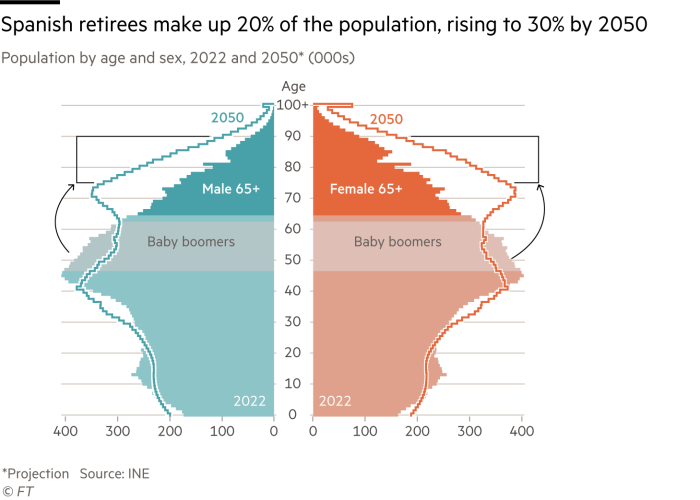[ad_1]
This article is an on-site version of our Europe Express newsletter. Sign up here to get the newsletter sent straight to your inbox every weekday and Saturday morning
Good morning. The number of protesters decrying French president Emmanuel Macron’s pension reforms are falling, but he can hardly celebrate that a mere 450,000 people cursed his name in Paris yesterday. Meanwhile, the rubbish continues to pile up.
Today, our trade supremo brings you the inside track on what goodies the US is willing to share with the EU from its $369bn green subsidy bonanza, and the EU’s competition chief tells us that Big Tech wants to avoid EU rules by pretending to be small.
Heavy metal
A long-awaited deal on how EU battery makers could access US subsidies is finally close, writes Andy Bounds.
Washington has offered to make five minerals used in batteries eligible for subsidies under its green-tech promoting Inflation Reduction Act if they are mined or processed in the EU, according to people with knowledge of the talks.
Context: The IRA has lined up some $369bn in subsidies for the green transition, offering things such as tax credits for electric cars. But battery components must come from countries with a US free trade agreement to qualify, which has the EU and European businesses fretting they will lose out.
US president Joe Biden promised EU commission president Ursula von der Leyen a deal on her visit to the White House earlier this month.
The five metals to be eligible under the IRA are cobalt, graphite, lithium, manganese and nickel, which are used in battery production. The US is expected to join the EU’s “critical minerals club”, the brand Brussels wants to use for its global partnerships in this sector.
But it seems like the EU is not the only friend with benefits.
Japan signed an agreement with the US yesterday, dropping tariffs on the same five minerals.
Yasutoshi Nishimura, Japan’s minister of economy, trade and industry, said the trade deal was likely to lead to an agreement for the same metals processed in Japan to be eligible for tax incentives under the IRA.
Washington is expected to announce its full guidance on IRA implementation this week.
EU carmakers already have one small victory. The US has agreed that customers using lease deals to buy EU-made electric vehicles can receive a tax credit under the IRA which was previously restricted to cars assembled in North America.
And Brussels officials say they are still hoping for further eleventh-hour concessions.
Chart du jour: Generational shift

One way to deal with ageing populations: Make the young pay more to support the old. Spain has opted for a pension reform that will increase the burden on the working population instead of cutting benefits for the retired.
Playing dumb
For EU competition commissioner Margrethe Vestager, size is everything.
The woman with the power to regulate Big Tech has accused players such as Apple and Amazon of playing down their size or deploying other tactics to game EU tech rules in their favour, writes Javier Espinoza.
Context: EU regulators have been working for years on a set of new tech laws designed to open up markets and make the internet a safer place for citizens. Rules for larger tech companies under the Digital Services Act and the Digital Markets Act are more strict than for smaller companies.
Some large online platforms have so far not revealed their exact number of users in Europe — a key metric to determine whether they will have to comply with more responsibilities under the DSA, which aims to regulate how Big Tech should police hate speech or illegal content.
Vestager told the FT that, suddenly, companies such as Google and Microsoft “feel very small”.
Her warning comes after Thierry Breton, the EU’s commissioner for the internal market and in charge of digital policy, said Brussels will go after companies that don’t disclose their numbers.
While Apple and other large US platforms have reported numbers that would put them in the scope, it is understood a handful of companies are still resisting the commission.
Vestager is adamant that the EU will prevail over Big Tech groups. “It’s not easy but they are not rogue. They are part of a system,” she said. “This is a union built on the rule of law and that’s fundamental.”
The commission has kept an “open door” policy whereby companies can ask questions to clarify the enforcement of the DMA, another landmark piece of legislation aimed at curbing the power of Big Tech.
Vestager hinted at tech companies using the system to their advantage to delay proper enforcement of the rules — such as their lawyers asking obvious questions. “We answer ‘difficult’ questions because we think that the DMA is quite clear and straightforward. [But] there’s a lot of billable hours in trying to figure out what it really means.”
She admitted that it is one thing to pass legislation and another to enforce it, particularly when big tech companies seem to be playing dumb.
“Making businesses change in their culture, in their business models, of course this is not going to be easy,” she added.
What to watch today
-
European parliament kicks off a two-day plenary session.
-
Ursula von der Leyen meets Kenyan president William Ruto.
Now read these
Are you enjoying Europe Express? Sign up here to have it delivered straight to your inbox every workday at 7am CET and on Saturdays at noon CET. Do tell us what you think, we love to hear from you: europe.express@ft.com. Keep up with the latest European stories @FT Europe
[ad_2]
Source link

